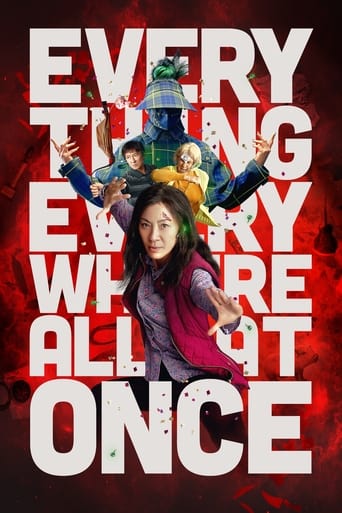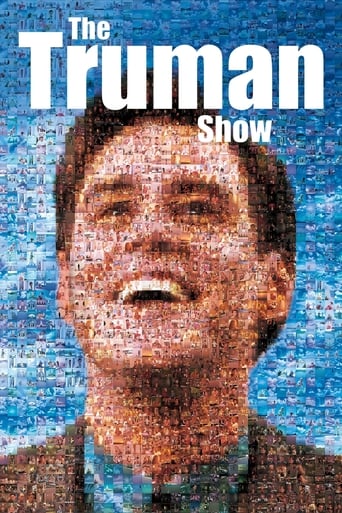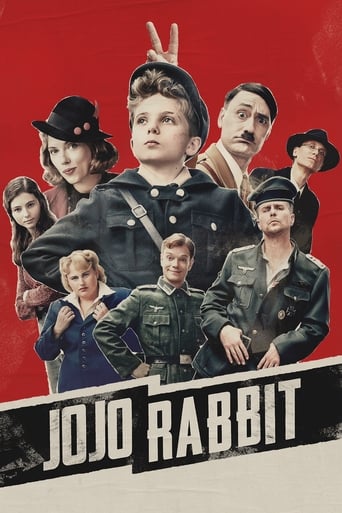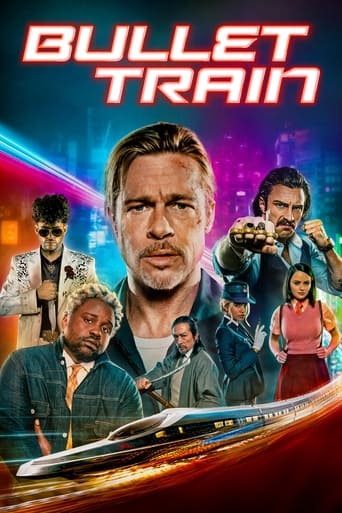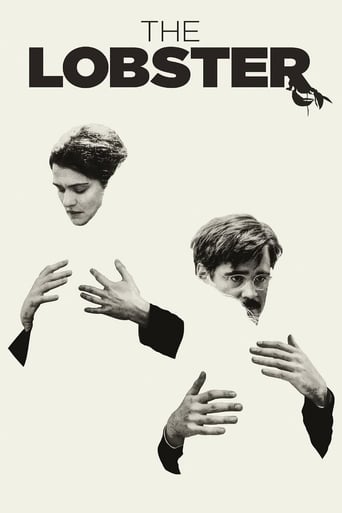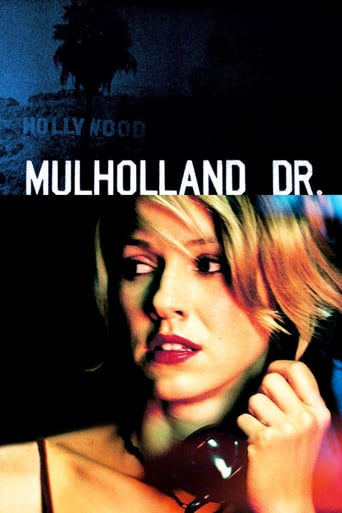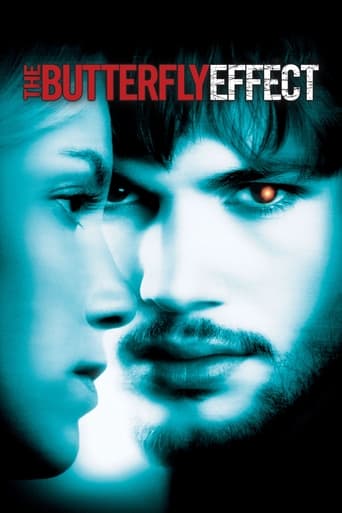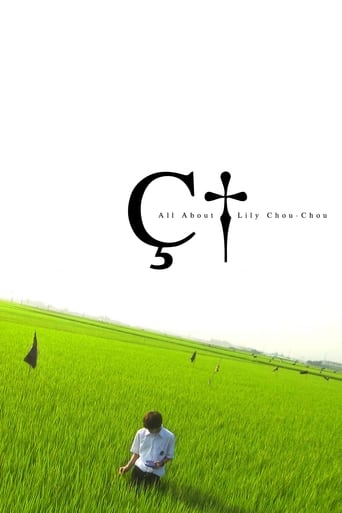


All About Lily Chou-Chou
Charts the troubled teenage years of students Yūichi Hasumi and Shūsuke Hoshino, exploring the shifting and complex power dynamics of their relationship against the backdrop of Yūichi's love for the dreamy and abstract music of fictional pop star Lily Chou-Chou.
-
- Cast:
- Hayato Ichihara , Shugo Oshinari , Yu Aoi , Ayumi Ito , Takao Osawa , Ryo Katsuji , Kaku Tomohiro


Similar titles

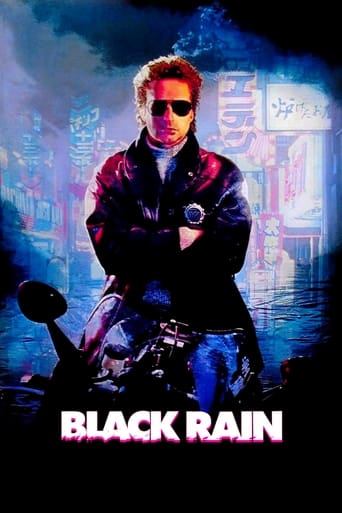
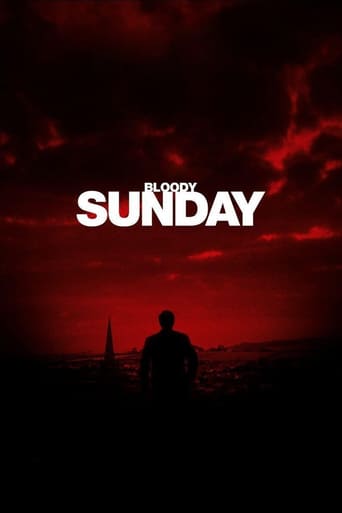
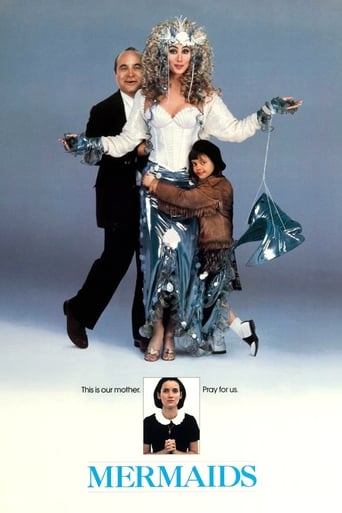
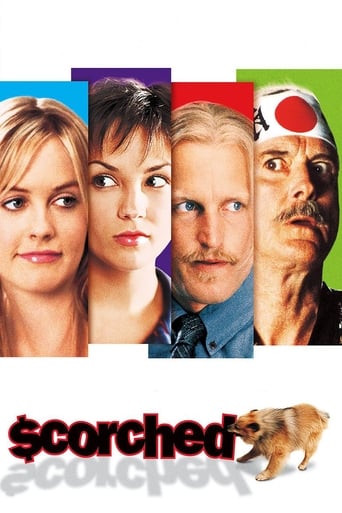


Reviews
If the ambition is to provide two hours of instantly forgettable, popcorn-munching escapism, it succeeds.
what a terribly boring film. I'm sorry but this is absolutely not deserving of best picture and will be forgotten quickly. Entertaining and engaging cinema? No. Nothing performances with flat faces and mistaking silence for subtlety.
Blistering performances.
The biggest problem with this movie is it’s a little better than you think it might be, which somehow makes it worse. As in, it takes itself a bit too seriously, which makes most of the movie feel kind of dull.
If there ever was a production that fit the definition, look and feel of a cult film then All About Lily Chou-Chou would be it. Filmed in Ashikaga in Tochigi Prefecture this film did well upon release in Japan in 2001, but it was the subsequent export, mystique and international fandom that have kept the ethereal film alive. There are many ways to describe 'Lily Chou-Chou Is Everything' (Riri Shushu No Subete in Japanese) and none of them would point to anything remotely mainstream or Hollywood-esque. It is a feel-bad movie that is nihilistic to the extreme, original and catches one off-guard and, independent of that depiction, there is a reasonable debate (in my mind anyway) as to whether it is good. The story revolves around the fanatics of the mythical artist Lily Chou-Chou whose art, to her fans and members of a website whose chat room message are integral and elucidating, is beyond anything merely terrestrial and is often described as embodying the 'ether.' Her fans live and breathe within the ether firstly because she is that sublime and secondly as an escape mechanism from the toll it takes to be a teenage high school student of fourteen in modern Japan. The students are perpetrators and victims of bullying, oppression, alienation, angst, prostitution, corruption and disregarded by a hopeless cadre of teachers and parents. Banish those images of Japan as an orderly and organized society with a disciplined and respectable school system. To be fair, however, whether anyone - including myself - really 'gets' this film is another matter. It comes across as lifelike, and partly due to the documentary-style camera-work which is most observable in the Okinawa and kendo sequences, but it is deliberately cryptic, open to interpretation and even ends without something as definite as one is expecting - perhaps as a nod to life in modern society in general. Incidentally, the travel to Okinawa, and its aftermath, is the most unrealistic. The money may have been procured through ill-begotten means, but what about the time, opportunity and parental permissions? Would one subsequently change so drastically? As if there was not enough confusion the film incorporates flashbacks. The pompous and simultaneously enlightening All About Lily Chou-Chou is filmed long and like a stream of consciousness and, if nothing else, will make one hate the younger generation and its enablers. I always thought striking imagery, penetrating story lines and intense music make for perfect films - think Blade Runner or Kill Bill or Lost in Translation - and this film has it all. The added element, however, is the extra disturbing content for which there is no preparation. On the flip side, All About Lily Chou-Chou's music is a success and laudable. With the film revolving around a recording artist it might be expected, but the alternative ambiance of Lily, as performed by the as-of-then unknown Salyu, is perfect for the concept of the 'ether' and for the suffocating world in which the anti-heroes live. While we are on the subject the film and Lily were inspired by Chinese singress Faye Wong. Lily/Salyu's Kaifuku No Kizu was included/mumbled in the film Kill Bill to boot. French composer Debussy's work is also prominently featured. Did I learn anything or know anything definitive from this film? Well, datsu or Needlefish is called Shijar in Okinawa. North is 'nishi,' east is 'agari,'south is 'fue' and west is iri.' Everything else is open to interpretation... On a good day Japan bewilders most people. All About Lily Chou-Chou out-bewilders the bewilderment.
I watched Lily Chou-Chou last night and was mesmerized and deeply moved by it. The use of lighting and shadow instantly produce a subject-less nostalgia, sort of a yearning without knowing what one is yearning for. Perhaps these youth yearned for a purpose. Confusion about identity is central to this film, and I felt a very helpless feeling throughout. The music, especially the song 'Kaifuku Suru Kizu' was very haunting. I don't know if it was the notion of 'ethereal music' placed at the beginning meant to trick the viewer into hearing something that isn't there, or if the music really contained an 'otherness'-either way, I felt something I hadn't before when I heard it. The song's been stuck in my head all day. Overall a soul-crushing movie that still remains realistic despite its dreamy feel. I think it accurately portrays the chaos of ideas and meanings and meaninglessness of our modern age colliding with human emotion. 8/10.
The worst thing to happen to cinema in the late twentieth century was the idea of audience expectations and the feeble classifications of genre. For me, a film should be viewed as a blank page; we go into them with no prior knowledge - other than that which is suggested by the title - and trust the instincts of the filmmaker to present their ideas in an interesting and intelligent manner. Some viewers seem to think that it is the job of the film to work "for them"; to offer them entertainment and appeal to their own personal tastes and wishes. This, however, is wrong. The viewer should work for the film, working out the overall intention of the filmmaker and the characters as well as deciphering what each individual scene means and how it accumulates to create a full, coherent whole. You might think such an approach is somewhat silly, and you're entitled to that; however, to dismiss any film because it didn't work for you personally is juvenile; especially when you consider that a film is made for mass distribution and thus, eventually, find their own audience, rather than forcing themselves on an unsuspecting public.Yes, this is a somewhat difficult film - in the sense that it has an entirely fractured narrative that plays out in no discernible order - but to dismiss it for this very reason is to accept a cinema without risk or experimentation. However, if you're willing to work a little harder at piecing the whole thing together, then the film will reward; not necessarily in the sense of being the kind of film that will leave you all warm and fuzzy inside, but rather, in the way that it forces us to think about certain ideas expressed through the characters and the atmosphere that is created through the incredibly stylised and hyper-real methods that the director employs. For me it felt like the future of film-making; a bold combination of every great auteur that has ever stepped behind the camera, but with its own voice and its own personality. For example, the opening image of the film - of our central character suspended in time within a vast, green, ocean-like field of waving reeds - is reminiscent of a number of films, from Shindô's Onibaba (1964) to Tarkovsky's Andrei Rublev (1969) and Malick's Days of Heaven (1978), but combined with that almost Kieslowski-like use of music and the further hints to Godard presented by the use of on-screen inter-titles, which here reveal elements of character background in a way that is entirely fitting to the uncharacteristic world that the film creates.Despite these references, the film never feels like an exercise in imitation, with the director advancing on the influence of these particular filmmakers and creating his own world that seems to exist in a heightened state of almost dreamlike self-awareness. The way that the camera often floats above and around the characters - with those huge locations stretching out endlessly around them - seems to suggest the ideas of alienation and disconnection, whilst also presenting the more interesting idea of characters purposely removing themselves from everything superficial, until only the very essential, natural elements remain. For me, it is one of the few films that really pushes the use of low-grade digital video equipment in a way that enhanced the story; putting it on a par with Lars von Trier's The Idiots (1998), Harmony Korine's Julian Donkey Boy (1999) and Takashi Miike's Visitor Q (2001) as a film that uses the natural abstraction of digital footage to further establish the subjective worldview of the characters. The movement of the camera is constantly suggesting the illusion of freedom or the ability to escape that is contrasted brilliantly against the cramped, dimly lit locations and the use of an uninviting sepia tone to suggest further elements of an expressive visual style tied to the feelings of its characters.It is a film that feels alive with ideas and energy; painting this world of Japanese youth lost and confused as violence and degradation swells all around them. The themes of the film are admittedly bleak, and indeed, the film is certainly an overwhelming and exasperating experience that leaves us breathless and worn. Again, it's partly down to the fantastic visual approach that director Shunji Iwai brings to the film and the way that it complements the thoughts and feelings of the characters and the various obsessions and preoccupations that form the backbone to their world. Understandably for a film that focuses on teenagers the use of music is incredibly important. Here it is as much a character in the film as a tool to tie the scenes together; with the enigmatic persona of Lily casting a massive shadow over the film as she becomes this all encompassing symbol for freedom and expression. The characters talk about music as a life-force and how it comes to represent a kind of ether in which they are helplessly suspended, and in keeping with this notion, the film takes on these elements as well.People need to stop approaching films with a definite idea of what to expect. There are no rules to film-making. No guidelines and regulations that must be followed in order to get a viewer from point A to point B, nor should there be any attempt on the part of the filmmaker to make concessions for an audience unwilling to take an active role in the way the film should be viewed. A film like this requires a sense of collaboration with the audience to think about the presentation of the narrative and the ideas expressed therein; creating a mood and an atmosphere that is reminiscent of Antonioni in the way that the film seems to just drift along, ambient-like, until that staggering final; at which point we're left with not only an overwhelming train of thought, but with a certain heightened perception of the world that is really quite remarkable.
I don't know why I bother with Hollywood when there are so many rich projects like this hiding in corners. The problem of course is finding them. The most significant benefit I get from writing IMDb comments is that readers lead me to them. That happened in this case.If you are an ordinary viewer , you probably won't like this. Its yet another dip into high school angst, overly long and structurally a bit too cute.I think you'll have to train yourself to watch films lucidly, but if you do, this will be quite effective. You will fall into it and really be influenced, much more viscerally than say "There Will be Blood," where there is no path for us to enter the world we watch.The matter of this concerns teen alienation, particularly through how we/they take things that happen and weave them into whatever simple, grand narrative is available usually through commercial pathways. Its a simple chord to strike, but one we all know, both from when we were that age, and from how we live now, which is only a half degree separated.You'll encounter death, teen prostitution, rape. Gang dynamics involving intense humiliation. Clueless adults of course. Sexual drives and identity vacuums of course, but subordinated to the more overwhelming urge to be part of a cosmic story. Usually, we ignore this in film, because sex and role are inherently more cinematic. Less true, but easier to show as true.Its the multiply nested structure that makes it work. The scenes are presented non- linearly. The overriding narrative is not what we see, but a collection of instant messages exchanged among the characters we see. These evoke the images we see, perhaps not as they happened, but as they are recalled. There's an overarching cosmos that these text messages reference, an abstract, perfect world of ethereal dynamics conveyed through a goddess, a girl singer. The slightest nuance from, the smallest bit of news about, the slightest rumor concerning this singer provides ledges for a life, for a whole gaggle of lives bumping up against each other.In the center of this thing, you have a radical departure. All of a sudden, instead of the camera anchored in the test messages, we have a camera rooted in reality. Its literally footage from video cameras from the core teen boys as they go on an exotic vacation to Okinawa. Naturally, the four spindly 14-15 year olds are guided by four of the most appealing older girls in memory. Its colorful, jerky. Full of life, a real, embodied life that by its appearance makes all the rest of the thing seem incredibly sad in its artificiality.Someone knew what they were doing when they put this together. Someone deep and true and of the kind we need more of if we are to make it through. Or do I hang my life on commercially available narrative too?Heh.Ted's Evaluation -- 3 of 3: Worth watching.

